
Like Listening?
Pop in those earbuds & listen to learn more about codependency on the Relate-Able Podcast
TLDR: We all want to feel like we belong and because of this, we often give up ownership of ourselves and find ourselves living with codependency, or a reliance on others to make us feel good about ourselves. Three big ways we do this are using others to regulate our emotions, merging our identity with another, and needing validation as a for of self-worth. As you strengthen your sense of self against these things, you will find much healthier and more satisfying relationships and more happiness in your daily life.
It’s a normal part of being human to want really great relationships with others. We are born with a drive to form attachments and connections and this carries throughout our life.
But sometimes we want these great relationships so much that we do things that, though well-intentioned, actually harm our ability to connect with others.
One of the biggest of those things is codependency.
What is Codependency?
Codependency means that you rely on other people to make you feel good about yourself. You thrive on their approval, desperately need to feel like you matter to them, and your mood and feelings about yourself hinge on your relationships.
It means that you prioritize love and acceptance by others over having an identity of your own and you lose yourself in the process. You could also say that it’s passing responsibility for your own feelings and emotions to another person, whether that’s a spouse or romantic partner, a child, a friend, a boss, a coworker, or anyone else in your life.
We all have a couple of fundamental needs. One of them I mentioned, and that is that we want really great relationships, we want to feel like we belong.
The other is a sense of autonomy. We want ownership of ourselves and to be able to make our own decisions.
But because we sometimes (mistakenly) believe that these two things can’t coexist, we downplay our autonomy in favor of belonging…and that’s when things start to go badly.
Even though it might seem like if you heavily prioritize relationships then they will thrive, this mindset can become incredibly problematic. When you don’t have your own sense of self, the connection and happiness you feel in a relationship starts to dissolve.
Let’s break this down and get more specific about what codependence looks like in relationships and how we can fix it when it’s happening.
Spotting It: Signs of Codependency
Most of us have heard of codependency and know it’s not good for us (it’s associated with things like depression and anxiety, relationship struggles, physical illness, etc.), but many of us are engaging in codependent behaviors without realizing it.
But you can’t fix what you can’t see, so it’s important to gain a good understanding of what codependency looks like.
Here are some common ways symptoms of codependency:
- Always feeling responsible for taking care of everyone in your life
- Doing just about anything to maintain a relationship (even when it’s one-sided)
- Feeling guilty or selfish if you take time for yourself
- Doing anything to avoid conflict
- Deprioritizing your own needs
- Feeling panicky about losing a relationship (even when it’s toxic)
- Not knowing what you want to do when you’ve got time to yourself
- Extreme reliance on other people’s compliments and approval
- Feeling hurt when someone doesn’t recognize your efforts
- Comparing yourself to others often
- Excessive self-sacrifice in order to earn love or prove your worth
- Difficulty making decisions
- A feeling of disconnection in your relationships (or like you can’t really be yourself)
- Feeling like you don’t really know who you are anymore
- Criticizing or controlling others
- Feeling a lack of love for yourself or trust in yourself
- Difficulty regulating your own emotions
- Feeling overwhelmed and burned out a lot of the time
- Having low self-esteem
If you see yourself in some of those, first, there’s a good chance you’ve got codependency happening and second, join the club!
Most people are doing this at some level and often not realizing it. So the fact that you’ve spotted it in yourself is a win.
How to Stop Codependency
There are 3 big ways that codependency shows up. Knowing about these can help you combat these, so let’s take a look at them and I’ll give you some guidance on how to stop.
#1: Emotional Regulation
Most people who struggle with codependency have a hard time regulating their own emotions. Big emotions can feel scary and hard, so it can be easy to try to pass those off on someone else.
And because family relationships (or other relationships) can be like a web that ties each of us to one another, one person passing their emotions off on someone else can have ripple effects that are damaging to everyone in the metaphorical web.
This kind of thing is a classic sign of codependence. Let me give an example in pictures to better explain this.
Codependent Emotions in Pictures
This drawing represents you and another person. The arrow between you and the other person shows that there’s a relationship between you. (Remember, this can be any relationship—spouse, sibling, boss, friend, parent.)
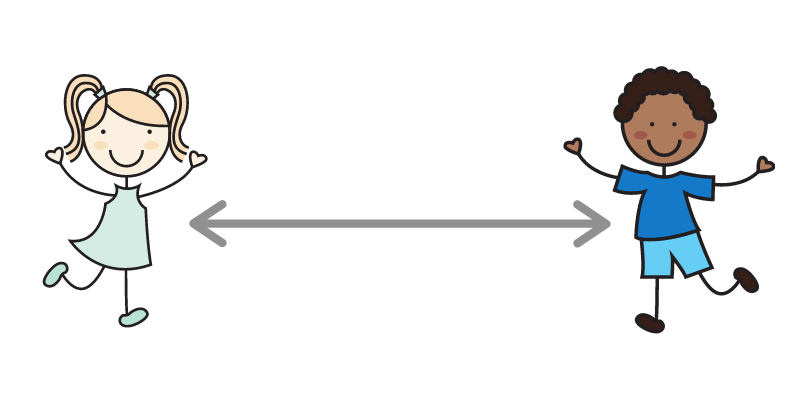
Now, let’s say you’re frustrated because you got stuck in a really bad traffic jam while you were in a hurry (represented by the “dark cloud” over your head). If you and the other person are codependent, you’re going to try to put some of the angst that you’re feeling onto your partner (represented by the squiggly line on your relationship). For example, this might mean snipping at him when you get home, even though he wasn’t there and has nothing to do with your bad experience.
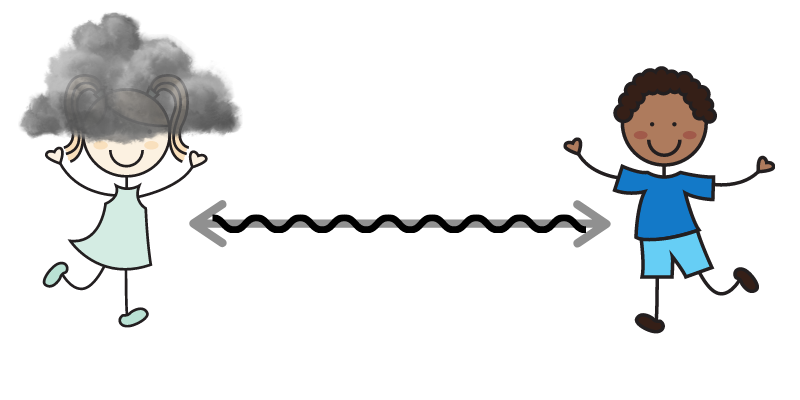
And because he’s codependent with you, he’s going to take your stress and own it and feel that discomfort himself as well. Maybe he’s going to feel responsible for making you feel better. (Which is NOT the same thing as giving you support after a hard day.) Or he’s going to start being in a bad mood too. And now no one is happy.
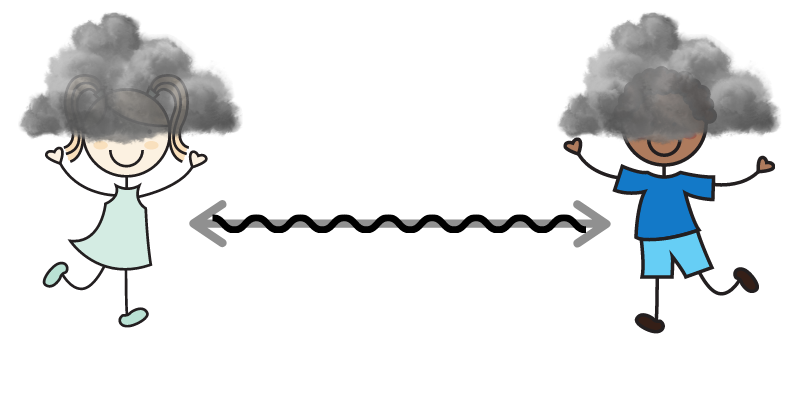
How to Fix This Behavior
If this sounds familiar to you, whether you are the person passing your emotions on someone else or the person picking up someone else’s emotions, this means you’ve got some codependent tendencies and it’s time to fix it. Here’s how:
#1: When you notice yourself feeling big and challenging emotions, pay attention to what you are feeling (without judging yourself). Do what you can to regulate that emotion in ways that you know work for you (this is different for all of us). Resist the urge to pass it off to someone else. (You certainly CAN ask for support and help. Just acknowledge that it isn’t someone else’s job to change it for you.)
#2: If you’re finding yourself picking up someone else’s emotions, recognize when it is happening and choose not to own their emotions (sometimes this gets called setting boundaries). You can show compassion, you can be kind, but you don’t have to try to fix everything for them.
Want to Feel More Connection in Your Marriage?
Get a Free Guide to the 3 Most Common Challenges in Marriage & How to Fix Them
#2: Merged Identity
Another big way that many of us engage in codependency is by losing our identity in the context of relationships.
This might be a mom who is so deep into motherhood that she can’t remember who she is other than a mom. If she gets time to herself she doesn’t know what to do because she’s lost her sense of self or she feels guilty because she “should” be taking care of the kids. (Being a mom is wonderful. But it’s critical to your own mental health and the well-being of your kids that you have a concept of who you are beyond motherhood as well.)
This can happen in a marriage if the two individuals think that they have to have the same hobbies, have to do everything together, or need each others’ approval for even small decisions. (Again, being close in marriage is a good thing, but in order to enjoy real connection you’ve got to be your authentic self…which means you need to feel free to be you and have hobbies, interests, and opinions of your own.)
This can even happen in other relationships like friendship or work relationships.
If you feel like you are defined by a relationship, chances are you’ve got codependency happening.
How to Fix This Behavior
If you find that you’ve lost a sense of who you are, it’s time to get to know yourself again. Take some time to think about how you like to spend your time, what you value, how you’d like things to be going in your life, and then implement some of these things. You’ve got to be proactive in reclaiming who you are in order to break out of this habit.
Needing Validation from Other People
The third area where codependency often rears its ugly head is in a need to earn approval from other people. Now, we all know that we shouldn’t rely on others’ approval in order to boost our sense of self-worth, and yet we are incredibly prone to this.
When you find yourself comparing your life, your actions, your choices, against someone else’s recognize that this likely stems from a need for reassurance that what you’re doing is enough.
When you find yourself tiptoeing around someone, doing everything you can to avoid conflict, or having a hard time making decisions, it’s probably because you hate feeling people’s disapproval or invalidation.
When you’re exhausted and overwhelmed because you’re always making sacrifices for others and caretaking everyone in your life and you neglect your own self-care, it’s probably because you feel like you’ve got to prove to someone how good you are. That someone might be the invisible expectations of others that live in your head, but it’s still real to you.
If you think you don’t seek validation from other people, pay closer attention, because this one is rampant and most of us are a little oblivious. And you’re doing yourself a HUGE favor if you can start to spot this and root it out.
How to Fix This Behavior
As I said, the best thing you can do for this one is start to spot it in your life. It’s happening, you just need to learn to see it. When you do, challenge yourself on it. Ask yourself why you need validation about that thing and then consider how you can value yourself without someone else doing it for you.
Strengthening Your Sense of Self
I’ve given you three ways that you can watch for your own codependent traits and begin to turn them around. As you work on this, what you will be doing is developing a strong sense of self.
Having a strong sense of self means you have a clear idea of who you are, you are comfortable with that person, and you are willing to stand by your values but also willing to confront yourself and change in needed ways (because you don’t need validation in order to feel good about yourself). It’s the best thing you can do for yourself and for your relationships.
Codependent Relationships
Remember that you can be a codependent person in any relationship—marriage or romantic relationships, friendships, parenting, with your parents, siblings, or other family members, or at work.
What can be really tricky is when you see it happening and the other person in the relationship is acting very codependently and you want to fix it but feel like you can’t.
And you’re right. Because guess what?
You can only fix you.
Great news—by realizing that and working on that you are literally breaking the cycle of codependency. You’re not looking to the person you’re enmeshed with and hoping they will fix it. You’re not waiting for their permission or approval. You’re taking action to improve who you are, to strengthen your ability to be yourself, to claim that autonomy that we talked about.
As you learn to move out of codependency, you’re going to find that you can enjoy healthy relationships that are stronger and more connective! It’s a beautiful thing to find that as you take more responsibility for yourself, your connection with others only gets better. It’s challenging to move out of this, but you can do it!
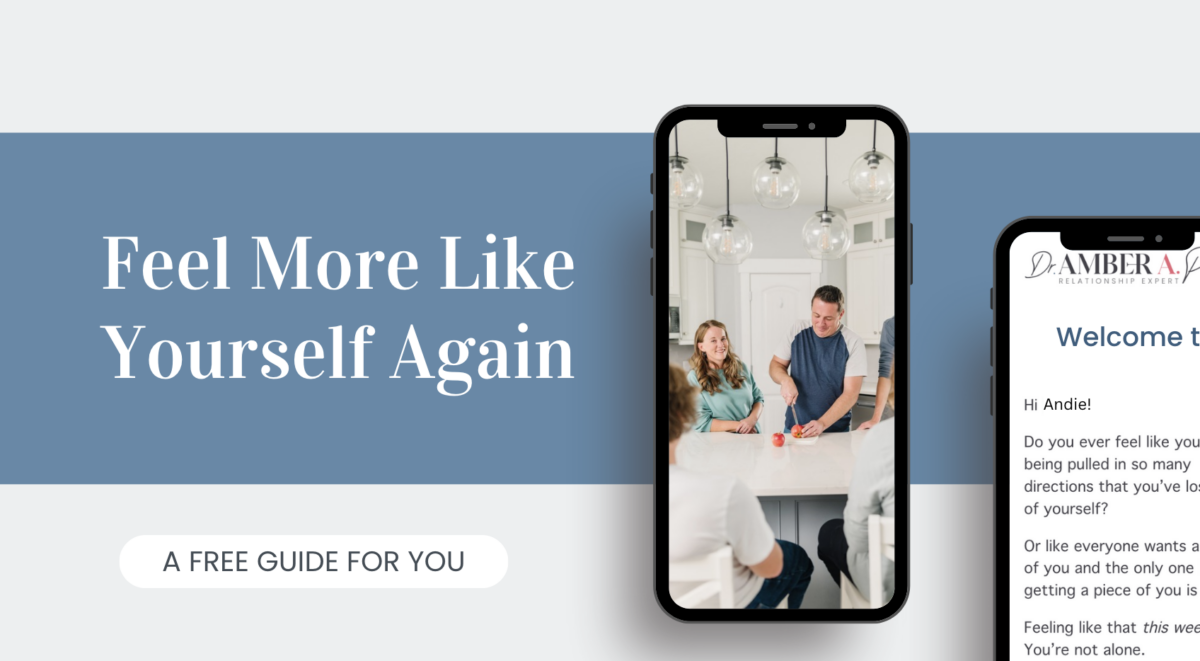
FREE Guide:
Me Again
A Simple Guide for Moms Who Want to Feel Like Themselves Again
Actionable Tips Right to Your Inbox!
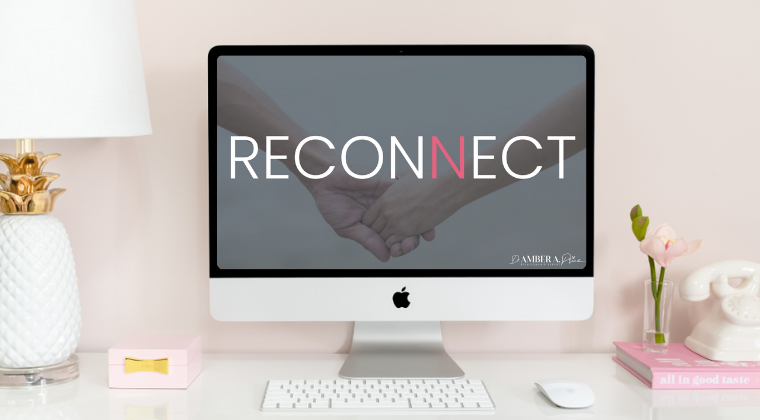
Want a Better Relationship?
Join Reconnect
An in-depth program for couples aiming to move from “fine” to fabulous. Reconnect offers weekly activities & insights to rediscover intimacy, beat unhealthy relationship patterns, enhance communication, & bring fun back into your partnership.
Learn More About This Program Here:
Fulfilling Connection with Yourself & Others







